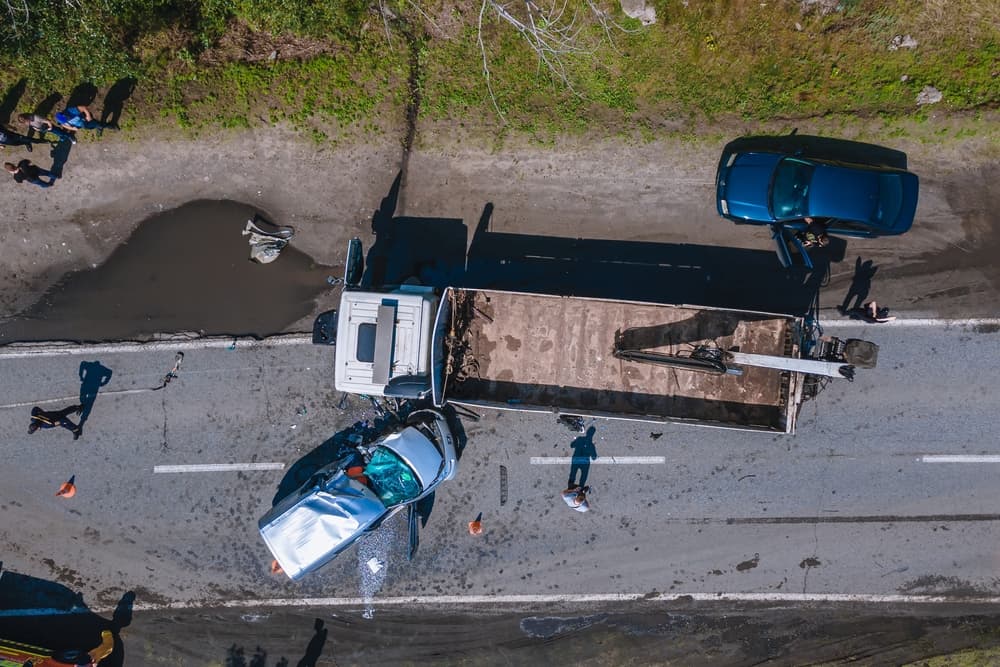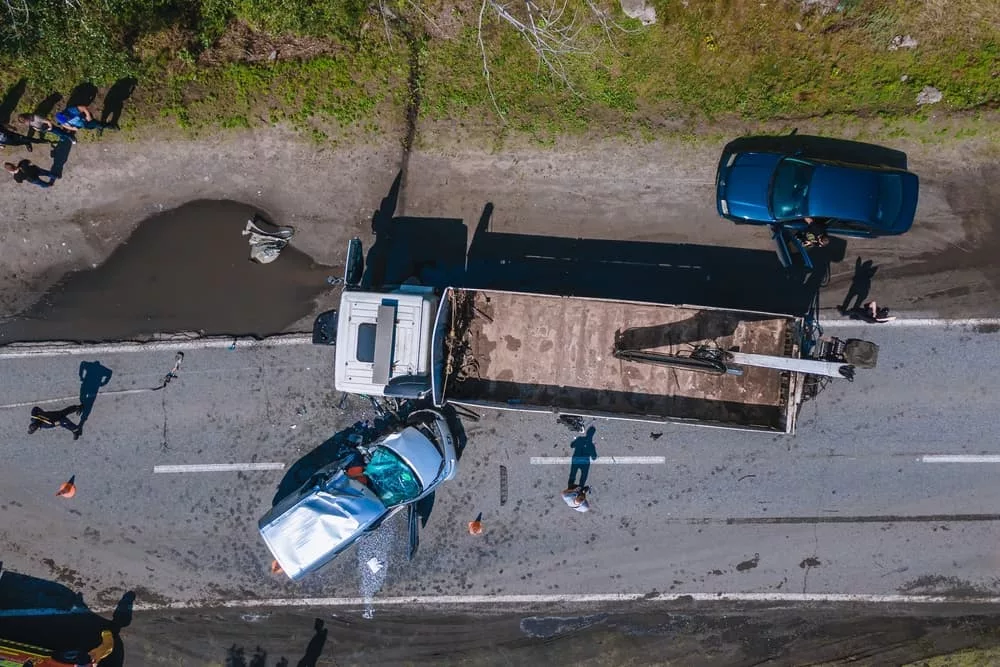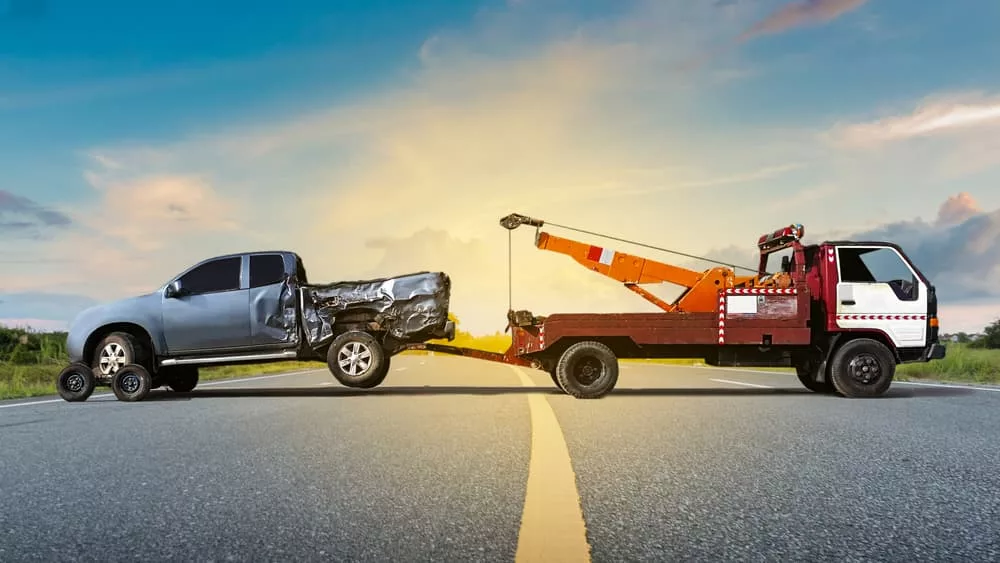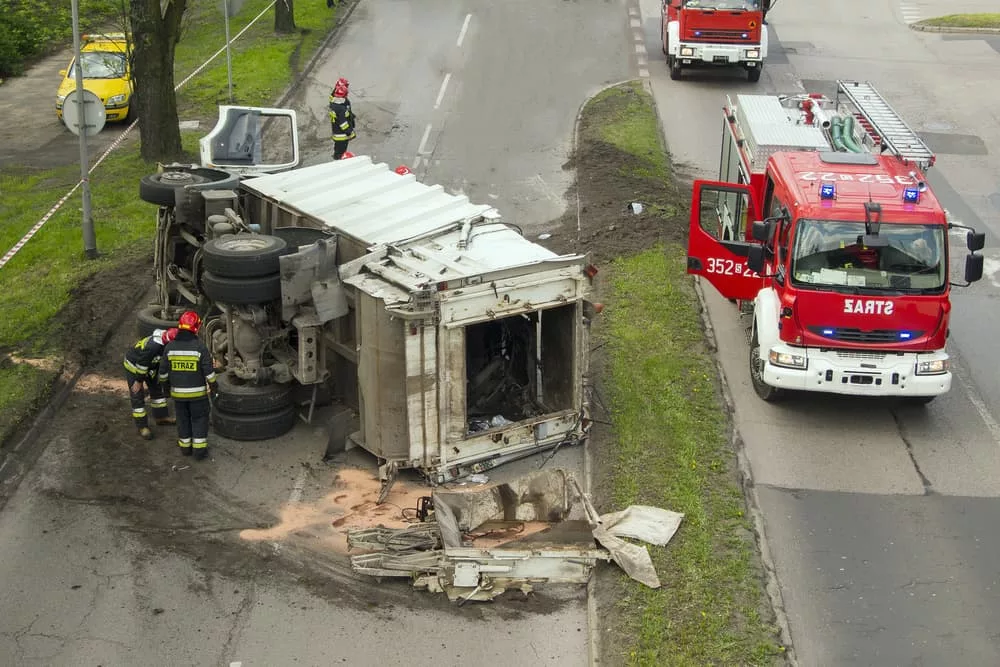Truck accidents can lead to catastrophic, devastating injuries, extensive property damage, and even fatalities. Understanding the causes of these accidents can prevent future occurrences and determine liability in the event of a legal claim.
If you or someone you love have been injured in a truck accident, reach out to a truck accident lawyer who can guide you through the legal process and advocate for your rights, helping you to achieve a fair resolution.
Schedule a Free Initial Consultation Today!
Negligence in Truck Accidents
Negligence refers to a person or entity’s failure to exercise the required level of care or responsibility, harming or injuring another party.

In truck accidents, negligence can manifest in a driver’s failure to abide by traffic laws or a trucking company’s failure to adequately maintain its vehicles.
Lawsuits arising from injuries sustained in a truck crash require you to establish negligence to recover damages for your injuries and losses. By demonstrating that the other party’s negligence caused the accident, you can hold the responsible party liable for your damages, including medical expenses, income losses, and pain and suffering.
An attorney can help you gather evidence of negligence and build a strong case against the party or parties responsible. They can obtain and analyze relevant documentation, such as logbooks, maintenance records, and driver qualification files, to identify any lapses in compliance or duty of care. Furthermore, they can seek qualified experts, such as accident reconstruction specialists or mechanical engineers, to provide insight into the cause of the accident and the nature of the negligence involved.
By identifying the specific actions or omissions that constitute negligence in a truck accident case, an attorney can help you understand your legal rights and options, advocate for your interests, and seek the compensation you deserve for your injuries and losses.
Driver Error Is a Leading Cause of Truck Accidents
Driver fatigue is a significant contributor to truck accidents, as it can impair a driver’s reaction time, judgment, and overall performance on the road. Fatigued drivers may struggle to maintain focus, respond appropriately to traffic conditions, or avoid hazards, increasing the likelihood of an accident.
To prevent fatigue-related accidents, The Federal Motor Carrier Safety Administration (FMCSA) implemented Hours of Service (HOS) regulations that govern how long commercial truck drivers can work and drive. These rules limit driving time and create mandatory rest breaks and minimum off-duty periods to ensure truck drivers have adequate opportunities to rest and recover.
Unfortunately, drivers often violate the HOS rules and, therefore, endanger the lives of others due to the risk of fatigue.
Distracted Driving
Distracted driving also causes many truck accidents. Distractions can include texting, eating, using a GPS, or adjusting the radio. These actions can divert a driver’s attention from the road, leading to delayed reactions, poor decision-making, and, ultimately, truck accidents.
If a truck driver’s distracted driving causes an accident, you can hold them liable for the resulting injuries and damages. Your attorney can gather evidence of distracted driving, such as phone records or witness testimony, to establish liability in your case.
Driving Under the Influence of Drugs or Alcohol
Driving under the influence of drugs or alcohol can significantly impair a truck driver’s ability to operate their commercial vehicle safely. This can result in poor judgment, slower reaction times, and an increased likelihood of accidents.
You can hold a truck driver or their employer liable for damages from a truck accident caused by driving under the influence. Your attorney can assist in determining if drugs or alcohol played a role in the accident and use this evidence to prove liability and recover damages.
Speeding and Other Reckless Driving Behaviors
Truck drivers can engage in reckless driving as they try to meet deadlines and combat traffic on the roads. Speeding increases the risk of truck accidents by reducing the driver’s ability to react to changing road conditions and increasing the severity of any potential collision.
If a truck driver’s speeding or reckless driving contributes to an accident, you can hold them liable for damages. An attorney can gather evidence of these behaviors, such as traffic camera footage, vehicle data, or eyewitness testimony, to support your claim and establish liability.
Impacts of Truck Maintenance on Accident Risk
Trucking companies must properly maintain their commercial vehicle fleet and keep it in safe working condition. This involves conducting regular inspections, addressing repair needs, and keeping accurate maintenance records. Trucking companies receive fines if they fail to meet these requirements.
Common maintenance issues that can increase the risk of truck accidents:
- Worn tires
- Malfunctioning brakes
- Faulty steering systems
- Broken lighting systems
When a truck or maintenance company does not address these issues promptly, they can cause mechanical failures and accidents, potentially endangering the lives of the truck driver and other road users.
Improper Loading and Cargo-Related Accidents
Improperly loaded or secured cargo can pose significant risks to both the truck driver and other road users. Shifting cargo can cause the truck to become unstable, making it more difficult for the driver to control and increasing the likelihood of a rollover accident. Additionally, unsecured cargo may fall from the truck, creating hazardous conditions for other vehicles in the vicinity and potentially causing accidents.
If a truck accident occurs as a result of improper loading or cargo securement, the responsible party could be liable for any resulting injuries and damages. This may include the truck driver, the trucking company, or the third party responsible for loading the cargo.
An attorney can hold the liable party responsible for a cargo-related accident by gathering evidence, such as maintenance records, loading protocols, and expert testimony.
Failure to Drive Appropriately in Changing Weather and Road Conditions
Inclement weather conditions, such as rain, snow, fog, ice, and high winds, can significantly increase the risk of truck accidents. These conditions can affect a truck’s traction, visibility, and braking capabilities, making it more challenging for drivers to maintain control. As a result, truck drivers must exercise caution and adjust their driving behavior accordingly during adverse weather conditions.
Truck drivers are responsible for ensuring they are driving safely and appropriately for the given weather and road conditions. This may involve reducing speed, increasing following distance, using headlights and turn signals, and avoiding sudden movements or maneuvers.
Failure to adequately adjust to adverse or changing weather or road conditions can result in accidents, you can hold the driver responsible for the damages and injuries that result.
Potential Liability of Third Parties Responsible for Road Maintenance
In some cases, accidents occur due to poor road conditions, such as potholes, uneven surfaces, or inadequate drainage. When you can prove that a third party responsible for road maintenance, such as a government agency or a construction company, failed to properly maintain the road, you can hold them liable for any resulting damages.
An attorney can help you assess whether poor road conditions contributed to a truck accident and whether you can hold a third party responsible. This typically involves investigating the road’s condition at the time of the accident, gathering evidence of previously reported hazards, and establishing any negligence on the part of the responsible party.
Truck Company Liability in Truck Accidents
Trucking companies have a legal responsibility to ensure the safe operation of their vehicles and the safe actions of their drivers. This includes properly maintaining and inspecting their trucks, complying with federal and state regulations, hiring qualified and properly trained drivers, and implementing safe practices and policies.
Several factors can contribute to a trucking company’s liability after an accident:
- Encouraging or allowing unsafe practices: If a trucking company encourages or allows its drivers to engage in unsafe practices, such as driving beyond the legally allowed hours of service or violating other safety regulations, you can hold it liable for any resulting accidents. An attorney can investigate a trucking company’s practices and policies to determine if they contributed to a truck accident.
- Hiring unqualified drivers: Trucking companies must only hire qualified drivers who meet specific licensing and training requirements. You can hold a trucking company liable if it hires or retains an unqualified driver who causes a truck accident.
- Failing to maintain vehicles: Trucking companies must maintain their vehicles in accordance with federal and state regulations. If poor maintenance causes a truck accident, you can hold the trucking company responsible for any resulting injuries and damages.
An attorney can determine if a trucking company’s negligence contributed to a truck accident by investigating the company’s practices, examining maintenance records, and reviewing employee qualifications.
Statute of Limitations for Truck Accident Cases
A statute of limitations sets a time limit for commencing legal action.
The statute of limitations for truck accident cases varies depending on the state where the accident occurs. Generally, the time frame for filing a lawsuit ranges from one to three years from the accident, but specific rules and exceptions may apply.
Failing to file a truck accident lawsuit within the time frame set by the statute of limitations can have severe consequences. If the deadline passes, you lose your right to bring a legal claim against the at-fault parties and can no longer recover any damages for your injuries. An attorney can help you understand the applicable statute of limitations in your case and file your lawsuit within the appropriate time frame.
Building a Strong Truck Accident Case
To successfully recover damages in a truck accident case, you need a lawyer to gather and analyze all relevant facts. This includes obtaining the police report, witness statements, photographs of the accident scene, truck driver’s logbooks, vehicle maintenance records, and any other documentation that can help establish liability and prove damages.
Your attorney can play a key role in this process. They will use their knowledge and experience to identify important evidence and properly preserve it. They can also work with experts, such as accident reconstruction specialists and medical professionals, to analyze the facts and build a strong truck accident case on your behalf.
Establishing Liability and Proving Damages After a Truck Accident
A successful truck accident case requires establishing the liability of at-fault parties and proving the extent of your damages.

To achieve this, your attorney can:
- Demonstrate the negligence of the at-fault parties, including the truck driver, trucking company, or other third parties.
- Prove the connection between the negligent actions of the at-fault parties and your injuries.
- Document the full extent of your truck accident damages, including medical expenses, income losses, future impacts on earnings, and pain and suffering.
An experienced attorney who can effectively use these strategies increases the likelihood of obtaining a favorable outcome in your truck accident case.
If you or a loved one suffers an injury in a truck accident, consult a knowledgeable and experienced personal injury lawyer to protect your rights and seek the compensation you deserve. With the support of a skilled legal team, you can focus on your recovery while your attorney fights for justice on your behalf.





